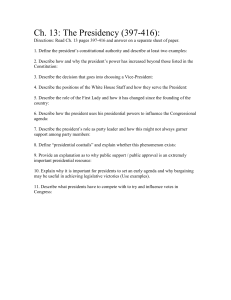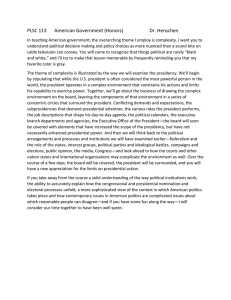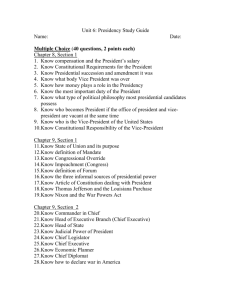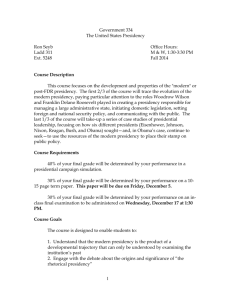Government 334 The United States Presidency Ron Seyb
advertisement
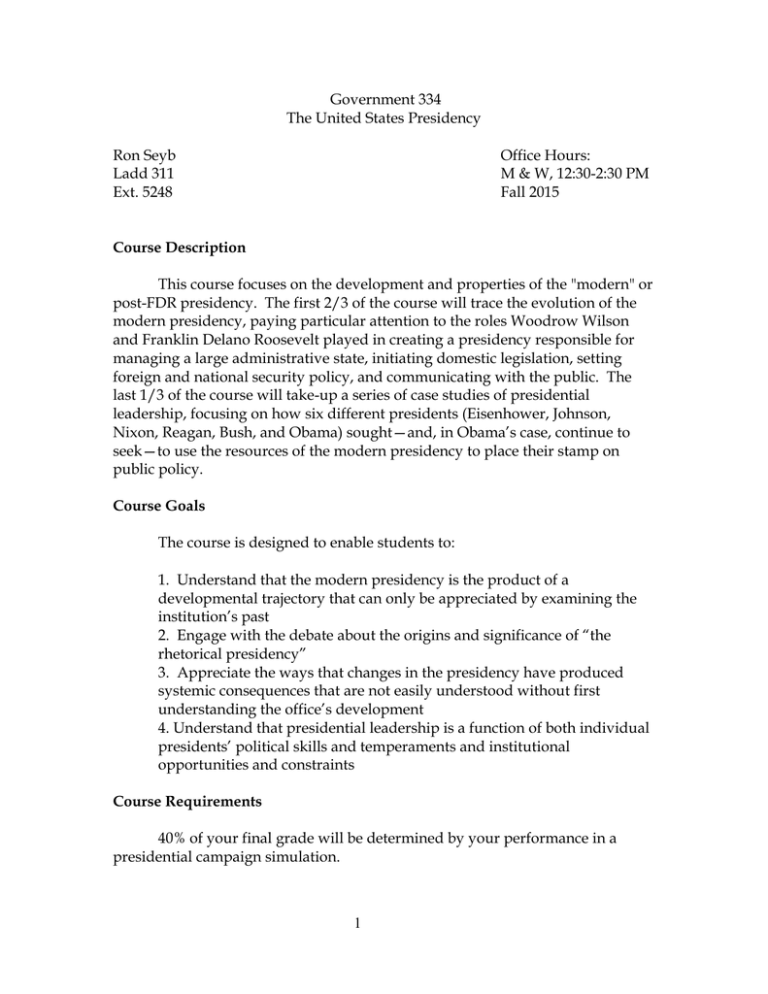
Government 334 The United States Presidency Ron Seyb Ladd 311 Ext. 5248 Office Hours: M & W, 12:30-2:30 PM Fall 2015 Course Description This course focuses on the development and properties of the "modern" or post-FDR presidency. The first 2/3 of the course will trace the evolution of the modern presidency, paying particular attention to the roles Woodrow Wilson and Franklin Delano Roosevelt played in creating a presidency responsible for managing a large administrative state, initiating domestic legislation, setting foreign and national security policy, and communicating with the public. The last 1/3 of the course will take-up a series of case studies of presidential leadership, focusing on how six different presidents (Eisenhower, Johnson, Nixon, Reagan, Bush, and Obama) sought—and, in Obama’s case, continue to seek—to use the resources of the modern presidency to place their stamp on public policy. Course Goals The course is designed to enable students to: 1. Understand that the modern presidency is the product of a developmental trajectory that can only be appreciated by examining the institution’s past 2. Engage with the debate about the origins and significance of “the rhetorical presidency” 3. Appreciate the ways that changes in the presidency have produced systemic consequences that are not easily understood without first understanding the office’s development 4. Understand that presidential leadership is a function of both individual presidents’ political skills and temperaments and institutional opportunities and constraints Course Requirements 40% of your final grade will be determined by your performance in a presidential campaign simulation. 1 30% of your final grade will be determined by your performance on a 1015 page term paper. This paper will be due on Friday, December 4. 30% of your final grade will be determined by your performance on an inclass final examination to be administered on Wednesday, December 17 at 1:30 PM. Attendance You are allowed to miss 4 (four) classes. There are no excused absences. I do not grant excused absences for two reasons: (1) I am unable to discriminate between a valid and an invalid excuse for an absence (i.e., I cannot tell the difference between those illnesses, celebrity break-ups, and 13 Going on 30 caliber caliber life changes that are serious and those that are trivial), and (2) Four absences allow you to miss a week of class without incurring any penalty. That is more generous than a Ted Cruz hair gel application. I will treat tardies as absences. I do often say significant things at the outset of class about readings, assignments, proper disposal of motor oil, etc. It is hence important that you be present at 11:15 AM. I will deduct 2% from your final grade for each absence over the 4 absence limit (e.g., a student who earns a cumulative score of “90” (A-) on the course assignments who compiles 4 absences will receive an “88” (B+) for the course). If you reach three absences, I will send you an email alerting you that your next absence will cause me to deduct 2% from your course grade. You should also keep in mind that according to The Academic Information Guide, "any students who miss more than a third of the (class) sessions may expect to be barred from (the) final examination. In such cases, the course grade will be recorded as F." Laptops Laptops and tablets are not allowed in class. I know how many families have been torn apart y social media—and that includes adorable meerkat families—and I am determined not to allow it to destroy our… uh… family thing. I recognize that not even the most steely of wills can resist these near occasions of sin. Students who have a disability that precludes them from taking notes with any instrument other than a laptop must provide me with documentation testifying to their “laptop needs” by the end of the second week of classes (i.e., Friday, September 18) 2 Smart Phones and Their Ilk I recognize that phones are now so essential to human life that they function as kidneys for many of us. You, nonetheless, cannot use these devices during class because, while I know that there is some dispute about this, the preponderance of the evidence suggests that they are distraction machines and not sparkling amulets of knowledge production. If I do see you texting in class or otherwise interacting with this brain cell killing field, then I will send you an email reminding you of the policy. Should I see you using your Tech Crunch Disrupt a second time, I will deduct two points from your course grade, with additional two point deductions tacked on for each additional time I identify a criminal pattern (NB: I do not accept appeals of the nature of “But I wasn’t texting.” You hence should try to avoid giving off even the appearance of texting). Books The following books are available at The Skidmore Shop for less than it cost the Bush family for the reconstructive surgery necessary to turn “Jeb Bush” into “Jeb!”: Harold Bruff, Untrodden Ground George Edwards, The Strategic President Michael Nelson, The Evolving Presidency Jeffrey Tulis, The Rhetorical Presidency Important Note about The Hodges Harbrace Handbook All Government majors are now required to own a copy of The Hodges Harbrace Handbook. While it would be ideal if you owned the most recent edition of this style guide (the 18th edition), you certainly can manage with an earlier edition in the same way that Nick Cannon manages to be grating even without Mariah Carey. Weekly Topics and Reading Assignments Note: An asterisk (*) denotes a reading available on Blackboard Week 1 (September 9-11): The Constitutional Presidency Readings: Bruff, Introduction and Chapter 1 Nelson, Document #1: The Constitution Week 2 (September 14-18): Abraham Lincoln and Presidential Prerogative Readings: Bruff, Chapter 5 3 Nelson, Document #14: Abraham Lincoln’s Letter to Albert G. Hodges SIMULATION ROLE PREFERENCE SHEET DUE (Must Be Submitted by 5:00 PM) MONDAY, SEPTEMBER 14) Week 3 (September 21-25): The Mute Tribune Readings: Tulis, Chapters 1 and 2 ANNOTATED BIBLIOGRAPHY DUE FRIDAY, SEPTEMBER 25 (Must be Submitted by 5:00 PM) Week 4 (September 28-October 2): George Washington as "Enlightened Statesman” Readings: Bruff, pp. 25-52 Nelson, Document #4: George Washington’s First Inaugural Address Nelson, Document #6: The Pacificus-Helvidius Letters *George Washington’s Farewell Address Week 5 (October 5-9): Thomas Jefferson and the Emergence of the American Party System Readings: Bruff, pp. 57-77 Nelson, Document #8: Thomas Jefferson’s First Inaugural Address Week 6 (October 12-16) Theodore Roosevelt and the Transition to the Rhetorical Presidency Readings: Tulis, Chapter 4 FIRST SIMULATION EVENT DOMESTIC POLICY DEBATES WEDNEDAY, OCTOBER 14 Week 7 (October 19-23): The Wilsonian Revolution Readings: Tulis, Chapter 5 *Woodrow Wilson, “Leaders of Men” Nelson, Document #43: Jimmy Carter’s Crisis of Confidence Speech TERM PAPER TOPICS DUE (Must be Submitted by 5:00 PM) FRIDAY, OCTOBER 23 Week 8 (October 26-30): FDR and the Making of the Modern Presidency Readings: Bruff, Chapter 8 4 *William Leuchtenburg, “Crash,” in William Leuchtenburg, Herbert Hoover *Huey Long, “Share Our Wealth Speech,” March 12, 1935 SECOND SIMULATION EVENT FOREIGN AND NATIONAL SECURITY POLICY DEBATES WEDNESDAY, OCTOBER 28 Week 9 (November 2-6): Presidential Leadership I: Eisenhower's HiddenHand Readings: *David Greenstein, “’The Hidden-Hand Presidency: Eisenhower as Leader’ a 1994 Perspective,” Presidential Studies Quarterly 24(2) (Spring 1994) *David Greenberg, “The Romance of Realism,” The New Republic (May 4, 2012) Week 10 (November 9-13): Presidential Leadership II: LBJ and the Brokering of the Great Society Readings: Edwards, Chapter 1 and pp. 119-136 *Carl M. Brauer, “Kennedy, Johnson, and the War on Poverty,” The Journal of American History 69 (1) (June 1982) Nelson, Document #34: Lyndon B. Johnson’s “Great Society” Speech Week 11 (November 16-20): Presidential Leadership III: Richard Nixon’s Corporate Presidency Readings: *David Greenberg, "Nixon in American Memory” *Barbara Kellerman, “Richard Nixon and the Family Assistance Plan,” Chapter 8 in Barbara Kellerman, The Political Presidency Week 13 (November 23): Catch-Up Readings: No Reading THIRD SIMULATION EVENT PRESENTATION OF POLITICAL ADVERTISEMENTS MONDAY, NOVEMBER 23 THANKSGIVING BREAK Week 12 (November 30-December 4) Presidential Leadership IV: Ronald Reagan as “The Great Communicator" Readings: Edwards, pp. 34-60 and 136-151 5 *Hugh Heclo, “The Mixed Legacies of Ronald Reagan,” Presidential Studies Quarterly 38 (4) (December 2008) Nelson, Document #44: Ronald Reagan’s First Inaugural Address TERM PAPER DUE FRIDAY, DECEMBER 4 Week 14 (December 7-11): George W. Bush, Barack Obama, and Presidential Leadership in a Polarized Era Readings: Edwards, pp. 166-187 *Jonathan Cohn, “How They Did It,” The New Republic (June 10, 2010) *Jacob Hacker, The Road to Somewhere: Why Health Reform Happened,” Perspectives on Politics (September 2010) FOURTH SIMULATION EVENT: FINAL SPEECHES AND VOTE WEDNESDAY, DECEMBER 9 FINAL EXAMINATION, FRIDAY, DECEMBER 18, 6:00-9:00 PM, LADD 207 6
